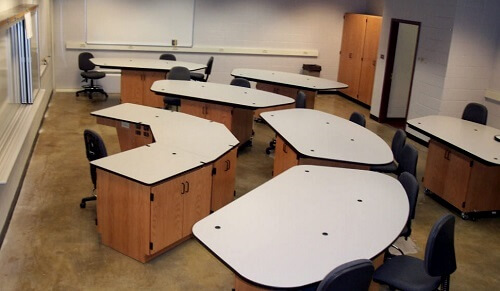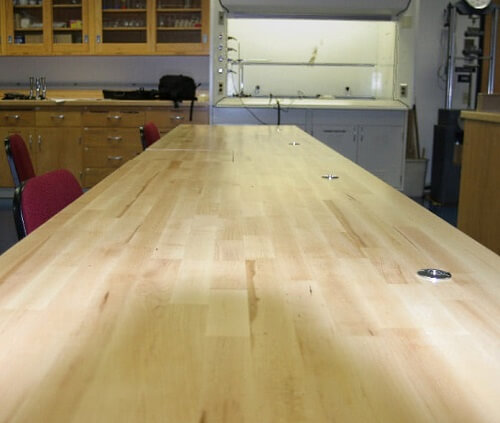How to Pick the Right Materials for Your Laboratory Counters
How to Pick the Right Materials for Your Laboratory Counters
Get the Best Work Surfaces for Your Lab Work
Selecting the material for your lab countertops will depend on what type of work you will be doing. Are you working with corrosive chemicals? High temperatures? Sterile environments? PSA Laboratory Furniture has many different materials suitable for all lab functions. Learn more about all the countertop options

Get started designing your new laboratory space.
Lab Countertop Material Types
Epoxy Resin Laboratory Counters
Epoxy resin counters use epoxy, silica hardener, and filler material to create an incredibly durable work surface. The finished counters are resistant to most chemicals, bacteria, and extreme heat. Epoxy counters are very popular in classroom laboratory settings where students will work with a variety of materials.
Best for: Labs working with lots of chemicals, fluids, and high heat sources.
Phenolic Resin Laboratory Counters
Phenolic resin countertops are similar to epoxy counters in terms of chemical resistance and durability. The major difference is the use of phenolic resin instead of epoxy, resulting in a cheaper counter. Counter thickness can be customized for greater long-term strength.
Best for: Labs working with chemicals, fluids, and some high heat sources.
High-Pressure Plastic Laminate Laboratory Counters
High-pressure plastic laminate countertops are made from several materials to provide versatile solutions for labs being designed on a budget.
Options include:
- Lab-grade laminates
- ESD laminates
- Marble
- Solid surface materials
All of these countertops are produced by applying a layer of plastic to a solid core. The plastic lowers the price of the counter. However, laminate is not recommended for certain lab environments. Recommended for labs requiring affordable countertops.
Best for: Labs without prolonged exposure to chemicals, heat, or fluids.
Stainless Steel Laboratory Counters
Stainless steel laboratory counters are incredibly durable, resistant to heat and chemicals, and long lasting. Well-maintained stainless steel can last for decades without needing replacement. The initial installation and design costs of stainless steel can be high for labs being designed on a budget. Labs looking for long-lasting work surfaces often use stainless steel.
Best for: Biomedical, pharmaceutical, and food science labs working with high temperatures, non-caustic chemicals, and sterile environments.
Edge Grain Maple Laboratory Counters
Edge grain maple counters, also called butcher block counters, are the final counter options from PSA Laboratory Furniture. Natural wood is treated with an acrylic coating to create a counter which can withstand solvents including alcohol and bleach. The classic appeal of wood has made these counters popular with test kitchens. However, the work surface is not entirely effective when dealing with moisture.
Best for: Labs which do not use harsh chemicals or fluids in large quantities.
Expert Advice on Laboratory Design
Still not sure which material is best for your workload? Contact our team of professional lab designers for assistance. We’ve worked with labs around the world and across every industry. PSA Laboratory furniture knows which material will be best for your work needs and design budget.
